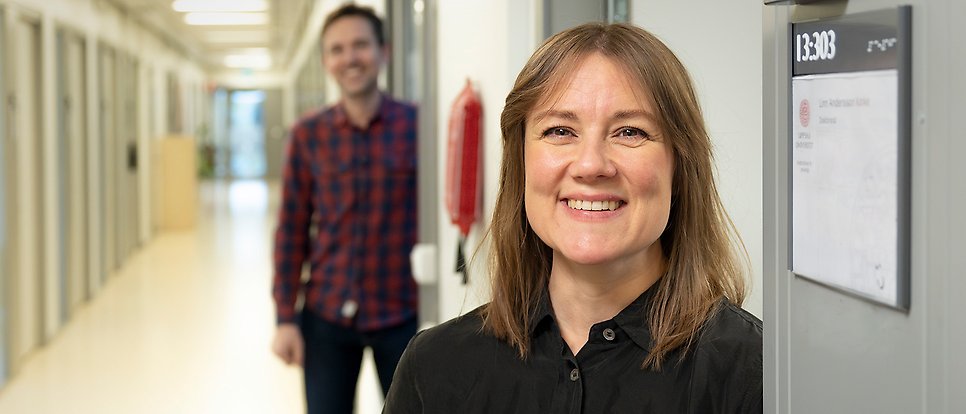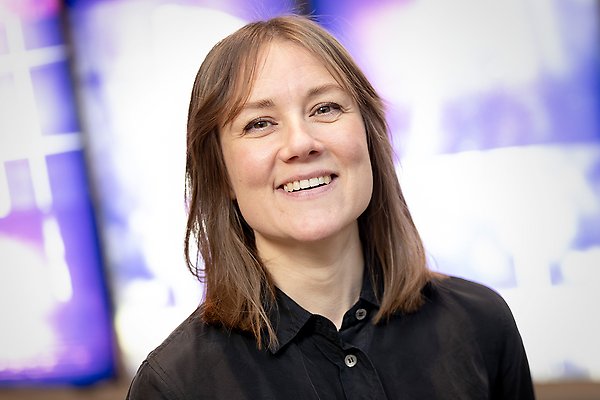Digital support for parents of children with difficulties

At the end of November 2023, Linn Andersson Konke will defend her thesis at the Department of Psychology at Uppsala University. Photo: Mikael Wallerstedt
An app that gives parents tools and healthcare providers insight into children’s well-being over time. This is what Linn Andersson Konke wants to develop now that her doctoral studies in psychology are coming to an end. Armed with new insights, she sees that there is a lack of early support and follow-up initiatives that can make everyday life easier for both parents and children.
“If you can help parents, they are best equipped to help their children,” says Linn Andersson Konke, who will defend her doctoral thesis at the Uppsala University’s Department of Psychology at the end of November this year.
She has conducted research within the framework of Projekt Småsyskon [the Younger Siblings Project], which examines early signs of autism spectrum disorders and ADHD in children between the ages of 5 months and 6 years who are younger siblings of children with one or both of these diagnoses. The project aims to contribute to increased knowledge about the early development of autism and ADHD.
Linn Andersson Konke primarily studied self-regulation in younger siblings, such as temperament and executive functions, which she did through both observations and having parents rate their children’s behaviours. It was her interactions with the parents that made the strongest impression on her, and also influenced her future plans.
Early support for parents and continuous follow-up
“I find that many of the parents are involved in the project because they think it is important to get early help for their children. In the study, our focus is not on diagnosis, but on examining early development before any symptoms appear. But there are many who also want a diagnosis for their child, because without it you do not really get those extra resources for the child that may come with a diagnosis, and I think that is sad,” says Linn Andersson Konke.

Linn Andersson Konke is in the starting phase of developing a family support programme that will help families with children who have difficulties in everyday life. Photo: Mikael Wallerstedt
The research shows unequivocally that early intervention is important for children with behaviours that cause problems in everyday life. Her frustration that so little of this knowledge is translated into practical benefits for parents and children led her to start thinking about what she could do about it.
“There is a lack of the right information, at the right time and in the right format for parents. I want to create a digital solution, an app, that both provides early and detailed guidance and allows for continuous monitoring of the child’s well-being. This would give parents better prospects of helping their children in different situations, in both the short and long term, and provide support regardless of diagnosis,” says Linn Andersson Konke.
Putting parents’ knowledge to good use
To develop her idea, she has support from UU Innovation’s advisers and an external mentor through their mentor programme. Validating the needs of parent groups has been the focus so far, and this work will continue in parallel with the next step, which is to develop a prototype of the app.
In addition to training and information material, an important function is enabling parents to rate and monitor their child’s well-being over time. Ultimately, she hopes to create a link from the app to the healthcare system to help healthcare professionals make more informed judgements about further support.
“I find it strange that we do not make better use of the knowledge that parents have about their children, and many have to wait far too long for support, and that is something that drives me. I have held some interviews and talked to many parents, but I need to get an even broader picture so that what I develop is meaningful to use,” emphasises Linn Andersson Konke.
Sara Gredemark
Doctoral thesis
Andersson Konke, Linn: Early Self-Regulation in Infant Siblings: Specific and Shared Associations to Emerging Autism and Co-occurring ADHD, 2023: https://uu.diva-portal.org/smash/record.jsf?pid=diva2%3A1803256&dswid=-3114
